What a weird and fascinating memoir. Basically, while the British held him after  the war, Höss wrote out a memoir, a few short documents, and some letters. They are collected in this book, which through its strangeness becomes a sort of lesson in evil. It is remarkable how utterly banal much of his descriptions of Auschwitz are. Much of his writing dwells on what are basically HR problems, having to do with lazy employees or employees who did a good job but created a bad work environment.
the war, Höss wrote out a memoir, a few short documents, and some letters. They are collected in this book, which through its strangeness becomes a sort of lesson in evil. It is remarkable how utterly banal much of his descriptions of Auschwitz are. Much of his writing dwells on what are basically HR problems, having to do with lazy employees or employees who did a good job but created a bad work environment.
When the methods of mass murder are described, they are done in a remarkably clinical manner, almost as if he’s describing any sort of factory equipment, in terms of its efficiency and effectiveness.
There’s also a sense of incompleteness borne of inconsistency here. At times Höss seems prepared to apologize and admit he lost his way. At other times, he reaffirms his commitment to national socialism, or makes comments about how dangerous Jews are. He also, perhaps most inexplicably, complains about the bad treatment he felt he was receiving as a prisoner.
Definitely worth reading, as it is a sort of window into a particular form of deranged compartmentalization.
The Master of Auschwitz (Höss, ed. Pastore)
 meandering and strange, and yet very beautiful. Like all good Dick novels, I can’t really explain it by trying to describe it. It’s a post-apocalypse book, but it’s really not like any other such book. It’s more of a poem in a certain sense. Anyway, go read it.
meandering and strange, and yet very beautiful. Like all good Dick novels, I can’t really explain it by trying to describe it. It’s a post-apocalypse book, but it’s really not like any other such book. It’s more of a poem in a certain sense. Anyway, go read it.
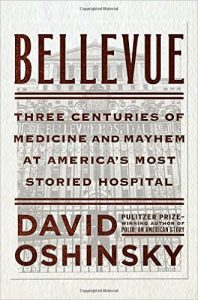 cleverly uses what is ostensibly a sort of biography of Bellevue to explore the history of medicine since the 18th century, and to explore the relation between hospitals, the government, and the public in the United States. It’s fascinating stuff.
cleverly uses what is ostensibly a sort of biography of Bellevue to explore the history of medicine since the 18th century, and to explore the relation between hospitals, the government, and the public in the United States. It’s fascinating stuff. victimized by the authors’ success. This book is basically a description of how the authors (and others) created google ngrams. It’s not just technical stuff either – it’s a lot of their philosophy of what they find interesting.
victimized by the authors’ success. This book is basically a description of how the authors (and others) created google ngrams. It’s not just technical stuff either – it’s a lot of their philosophy of what they find interesting.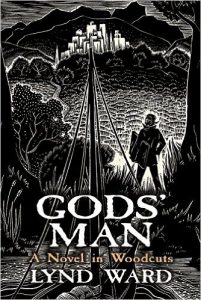 of what would later become the Graphic Novel. It’s a beautiful, if simple, story told in a series of gorgeous woodcuts with an incredible 1920s art deco feel to them. I went through it somewhat quickly, but I find the images stay with me. Definitely worth a look.
of what would later become the Graphic Novel. It’s a beautiful, if simple, story told in a series of gorgeous woodcuts with an incredible 1920s art deco feel to them. I went through it somewhat quickly, but I find the images stay with me. Definitely worth a look.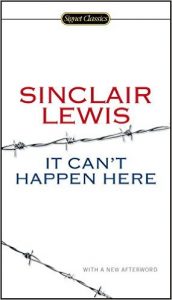 has to do with the idea of a sort of populist fascist coming to power in America). I’m a bit torn on it.
has to do with the idea of a sort of populist fascist coming to power in America). I’m a bit torn on it.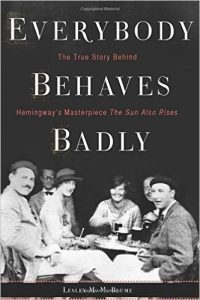 a slice of Hemingway’s early life, right up until that book made him famous (and a tiny bit afterward). My only gripe is it participates in this notion about Hemingway that I’m not quite ready to sign up for – that he was some sort of master of image creation. I’m sure he put forward an image of himself, but that’s true of every writer. It’s not obvious to me that he does it more than just about anyone else, and I don’t see him as especially calculating about it. I mean, he did put forward an image, but he also really actually liked drinking hard and watching bullfights.
a slice of Hemingway’s early life, right up until that book made him famous (and a tiny bit afterward). My only gripe is it participates in this notion about Hemingway that I’m not quite ready to sign up for – that he was some sort of master of image creation. I’m sure he put forward an image of himself, but that’s true of every writer. It’s not obvious to me that he does it more than just about anyone else, and I don’t see him as especially calculating about it. I mean, he did put forward an image, but he also really actually liked drinking hard and watching bullfights. only complaint (and, it’s a bullshit complaint) is that I really prefer a particular type of puzzle – the kind that is simple enough to easily hold in one’s head, and which doesn’t benefit from having pencil and paper. Some of the puzzles had interesting results, but really just required you to sit and write out a little algebra.
only complaint (and, it’s a bullshit complaint) is that I really prefer a particular type of puzzle – the kind that is simple enough to easily hold in one’s head, and which doesn’t benefit from having pencil and paper. Some of the puzzles had interesting results, but really just required you to sit and write out a little algebra.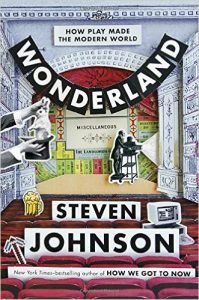 pleasure very important to the history of science, technology, and culture. As an example, Johnson argues that interest in automata helped lead (if a little indirectly) to the development of computers. Apparently, Babbage was quite interested in these early robots as a child, and it probably influenced his work. Johnson discusses other topics, such as the spice trade and the development of the Jacquard loom.
pleasure very important to the history of science, technology, and culture. As an example, Johnson argues that interest in automata helped lead (if a little indirectly) to the development of computers. Apparently, Babbage was quite interested in these early robots as a child, and it probably influenced his work. Johnson discusses other topics, such as the spice trade and the development of the Jacquard loom.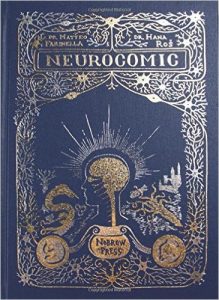 neuroscience and history of brain studies. It’s an interesting idea, but it didn’t really work for me. The artwork is very rudimentary, and the concepts are fairly straightforward. It didn’t feel to me like the ideas especially benefited from a comic format. The book did have an interesting sort of dreamy feel, in which a man goes through a sort of Alice in Wonderland style world of the mind, but ultimately I didn’t feel the concept paid off so much as provided occasional enigmatic bookends to sections.
neuroscience and history of brain studies. It’s an interesting idea, but it didn’t really work for me. The artwork is very rudimentary, and the concepts are fairly straightforward. It didn’t feel to me like the ideas especially benefited from a comic format. The book did have an interesting sort of dreamy feel, in which a man goes through a sort of Alice in Wonderland style world of the mind, but ultimately I didn’t feel the concept paid off so much as provided occasional enigmatic bookends to sections. the war, Höss wrote out a memoir, a few short documents, and some letters. They are collected in this book, which through its strangeness becomes a sort of lesson in evil. It is remarkable how utterly banal much of his descriptions of Auschwitz are. Much of his writing dwells on what are basically HR problems, having to do with lazy employees or employees who did a good job but created a bad work environment.
the war, Höss wrote out a memoir, a few short documents, and some letters. They are collected in this book, which through its strangeness becomes a sort of lesson in evil. It is remarkable how utterly banal much of his descriptions of Auschwitz are. Much of his writing dwells on what are basically HR problems, having to do with lazy employees or employees who did a good job but created a bad work environment.